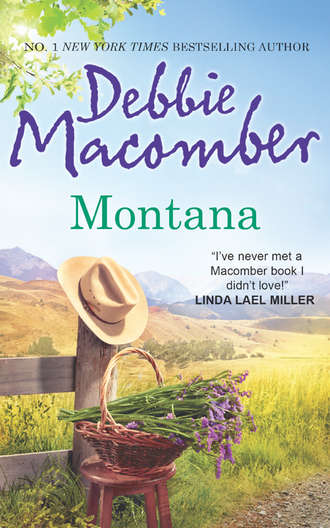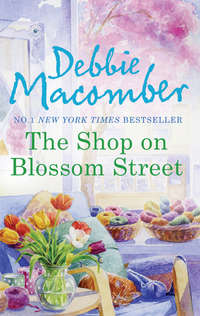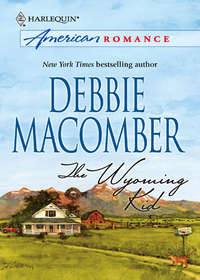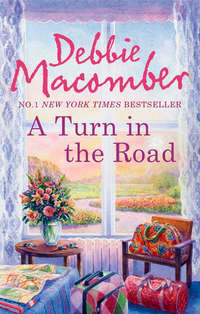
Полная версия
Montana
They exchanged handshakes as Molly mulled over where she’d heard the name before.
“I’m your grandfather’s attorney,” he added.
Gramps’s letter. That was why the name was familiar. Her grandfather had mentioned him when he’d told her about having his will updated.
“Would you have time for a cup of coffee?” he asked, glancing at his watch. “I’ve got an hour before my next appointment and there’s a matter I’d like to discuss with you.” He seemed slightly ill at ease about this.
Molly wondered what he could possibly have to say to her; she couldn’t help being curious and, to her surprise, tempted. Russell Letson was one of the best-looking men she’d seen in a while, and what amazed her was that he didn’t seem to know it. Russell added, “It won’t take long.” Just when Molly was about to agree, Sam walked into the bank, and she experienced a twinge of disappointment. “I’m afraid I can’t today.”
“Dinner then?” he suggested. “Tomorrow night, if that’s agreeable?”
“I …” Too stunned to respond, Molly stood in the middle of the bank with her mouth hanging half-open while she struggled for an answer. A date. She couldn’t remember the last time a man—an attractive single man—had asked her to dinner.
“I don’t know if Walter’s told you, but there’s a decent steak house in Sweetgrass now. We could talk there.”
“Sure,” she said, before she could find a convenient excuse. “That’d be great.”
He set a time for dinner and promised to pick her up at the ranch, although it was well out of his way. Handsome and a gentleman, besides. She could grow to like Russell Letson, Molly decided. He was a pleasant contrast to the surly foreman who’d driven her into town.
“I’ll see you tomorrow evening, then,” Russell said, giving her a small salute before walking out of the bank.
It had happened so fast Molly’s head was spinning. She walked over to Sam, who leaned against the lobby wall, waiting for her.
“What was that about?” he asked with a scowl.
After the silent treatment he’d given her all the way into town, she wasn’t inclined to answer him. “Nothing much.”
“You’re letting Letson take you to dinner.”
If he already knew, why had he asked her? “As a matter of fact, I am,” she returned, and enjoyed the rush of satisfaction she felt at letting him know she had a date.
Four
It felt good sitting on the porch, rocking and whittling, Walt Wheaton mused. Molly’s boys sat on the top step, sanding a couple of carvings he’d fashioned from canary wood. The yellowish wood was one of his favorites. He hadn’t worked on his carvings for at least six months. Molly and the boys had renewed his energy. Gladdened his heart. He might not always remember what day of the week it was anymore, but that didn’t matter. Not now, with Molly and the boys here where they belonged.
It wouldn’t take much to imagine it was his own Adam sitting on that step, forty or so years back, with a school friend. Or to imagine his Molly in the kitchen getting dinner ready to put on the table.
Walt’s fingers skillfully moved the sharp knife over the wood, removing a sliver at a time, cutting away everything that wasn’t the bear. He’d chosen oak for this piece, and the black bear would stand about ten inches high on his hind legs. He’d give it to Tom. The boy reminded him of a young bear, struggling to prove his manhood, all legs and arms and feet. He remembered himself at that age, when his voice had danced between two octaves. He’d been tall and thin like Tom, with legs like beanpoles and no chest to speak of.
Walt toyed with the idea of saying something to his great-grandson. He wanted to assure Tom he’d fill out soon enough, but he didn’t want to embarrass the boy.
The three worked in comfortable silence. Walt yearned to share stories of his youth with the two brothers, but talking drained his energy. The hell with it, he decided. God had given him the opportunity to spend time with these young ones and he was going to use it.
“Bears eat trees, you know,” he stated matter-of-factly.
Tom glanced up. “Trees? Are you sure, Gramps?”
The older of Molly’s two boys had a skeptical nature; Walt approved. He didn’t like the idea of his kin accepting anyone or anything at face value. He suspected his granddaughter might be more easily swayed, but her son wouldn’t be. It reassured him that the boy revealed some good old-fashioned common sense, a virtue in shockingly short supply these days. Take that local militia group, for example. He’d butted heads with them more than once in the past few years. While Walt didn’t necessarily agree with everything the government did, he sure didn’t believe the militia’s wild claims of foreign troops planning to invade the country with the assistance of the federal government. That was as ludicrous as their other ideas, like computer chips surgically implanted in people’s brains so the government could control their activities. He’d never heard such nonsense in all his days and cringed every time he thought about decent folks believing such craziness.
“Gramps?”
Tom’s voice shook him out of his thoughts. He had trouble keeping his mind on track these days.
“What is it, son?”
“Is that true?”
He frowned. What was the boy talking about? The militia’s paranoid ideas, he guessed. Wasn’t that what they’d been discussing? “Of course it’s not true,” he barked. This computer-chip nonsense was as asinine as the supposed sightings of black helicopters swooping down and spraying bullets from the sky. “Question everything, son, you hear me?”
Tom nodded and returned to his sanding.
With his heart as weak as it was, Walt didn’t know how much longer he’d be around on this earth. He liked to think there’d be time to tell Tom and Clay about life during the Great Depression. And the war. Children these days didn’t know the meaning of hardship, not like his generation.
“Gramps?” Clay stared at him expectantly. “But you said bears ate trees. So don’t they really?”
Oh, yeah. That was it—that was what he’d said. About bears. “They eat the bark,” he explained, his mind traveling the winding twisting byways of time long since passed. He shelved the depression stories in order to explain what he knew of bears. “They scrape off the bark with their claws. Without the bark, the tree dies. So, yeah, you could say bears eat trees. Next time you’re in the forest, take a gander at a dying tree. If it isn’t some disease, my guess is that a bear’s been clawing on it.”
“Is that why you’re carving a bear?” the older boy asked. “Because they eat trees?” He ran the sandpaper lightly over the carving of the owl. Watching him reminded Walt that he didn’t see many of the northern saw-whet owls these days. The saw-whet was small as owls went, only seven inches high, and weighed less than four ounces.
He didn’t get much opportunity to study nature the way he once had. He missed his walks, missed a lot of things, but that was all part of growing old.
“Gramps?” It was Tom again.
“What is it, son?”
“Clay asked you about the bear. Why you’re carving it.”
“Oh, yes … the bear. It nearly got me, it did at that.”
Both boys stared up at him, and he grinned, recalling the adventures of his youth. “I happened upon her clawing up a conifer. I was just a kid at the time, but old enough to know better than to do something stupid—like get too close to a bear,” he added, muttering to himself. “Neither my horse nor I saw her until it was too late. The mama bear had two cubs and she was in no mood for company. She reared onto her hind legs and scared my horse so badly he tossed me clean off. I thought I was a goner for sure.”
Both boys listened intently. “What happened next?” Tom asked.
“Happened?” Walt chuckled, remembering the incident as vividly now as that day almost seventy years ago. He smiled and continued whittling as his mind filled with the details of that fateful afternoon. “Once I recovered enough to stand, I took off running, screaming at the top of my lungs.” He shook his head, grinning again.
“How old were you, Gramps?”
“Ten or so,” Walt answered. “My legs were good and strong.”
“So you ran?” Clay’s hands went idle.
“I didn’t figure on hanging around there and letting that bear eat me for dinner.” This reminded him of another lesson Molly’s boys needed, a lesson only a man would think to teach them. Women didn’t take to fighting much; they didn’t understand a man’s need for confrontation. What was important, however, was knowing when to fight and why. Knowing what was worth fighting for. And yet there were times when all the questions might have the right answers and still the best thing to do was walk away. He’d turned his back on a fight or two, and it had taken far more courage to back down than it had to stand his ground.
“She didn’t catch you, did she?” Clay asked.
“Damn near, but my pappy saved me.” To this day Walt remembered the surge of relief he’d experienced when his father burst into the clearing, his horse at full gallop. He’d raced toward Walt and it was hard to figure who’d reach him first, his father or the bear.
“My pappy saved me,” he said again. “He galloped up, grabbed me by the arm and swung me over his horse’s back.”
Even with his eyes so tired and faded, Walt saw the awe in the boys’ faces. He nodded slowly. It did his heart good to spend time with Adam’s grandsons. They needed a man in their lives, someone to take the place of their useless father. He wanted to teach these boys, but he didn’t have much time left.…
The screen door creaked and Molly stepped onto the porch, holding the door open. “Dinner’ll be ready in ten minutes,” she announced. “Time to put your tools away and wash your hands.”
Almost from the minute they’d arrived, Molly had been scrubbing and cleaning that kitchen. It comforted him, somehow, to see her put the house to rights. His own sweet Molly would’ve thoroughly disapproved of his housekeeping methods. He probably should have hired one of the women from town to take a scrub brush to the place, at least before his granddaughter arrived to find such a mess.
He’d always intended to hire a housekeeper, but had yet to meet anyone he wanted in his home for longer than five minutes. Nor did he like the idea of a stranger touching his Molly’s things. Maybe Ginny, but she didn’t keep her own house too well, and he’d wager she’d be insulted if he suggested she clean his, even if he was willing to pay her.
Tom and Clay didn’t need to be told twice about dinner. They were inside the house quicker than two jackrabbits. Walt wasn’t as fast on his feet. He heaved himself up, grateful that the boys had put away his carvings and tools. That Tom might have a smart mouth on him, but at heart he was a considerate kid. Walt took a deep breath, inhaling the aroma of something delectable. He didn’t know what his granddaughter had cooked, but the tantalizing smells wafting from the kitchen told him he was in for a treat. Preparing meals had become an onerous chore; more and more of late Sam had been seeing to his dinner.
Walt trusted Sam, and that trust hadn’t been given lightly. It was why he’d asked his foreman to drive Molly into town earlier in the day. When they returned, Sam had silently carried in the groceries and left immediately afterward. Walt smiled to himself, amused at the way Sam was keeping his distance since Molly’s arrival.
Walt headed for the kitchen, moving at his own pace. Although Sam hadn’t said anything, he probably wasn’t too keen on Molly dating Russell Letson. It surprised Walt that she’d agreed to have dinner with that puppy of an attorney. The boy hadn’t let any moss grow under his feet, that was for sure.
Letson was a good man, shy and kind of quiet. Nothing like his father, who’d been outspoken and opinionated. His son seemed to keep to himself. He wondered why Russell hadn’t married. Of course there weren’t a lot of marriageable women around Sweetgrass.
Now that Molly was here, Walt suspected plenty of young men would be dropping by the ranch. Once they got a good look at his granddaughter they’d find excuses to visit. Pretty as a picture, Molly was. Smart, too, and a fine cook. Given time, she’d make a good rancher’s wife.
He believed that Molly needed a man, although he was sure she’d disagree with him. He’d like to see her get married again. She was still young and if she remarried, she’d probably have more children. It saddened him to realize he wouldn’t be around to know and love them, but he refused to think about that. He was determined to enjoy what time he had with her and the boys and let the future take care of itself.
He paused in the doorway leading to the kitchen. He barely recognized the room. The walls shone because Molly had washed them, the floor boards gleamed with wax, and the windows sparkled behind new gingham curtains Molly had sewn on her grandmother’s old Singer. She’d found a length of cotton up in the attic; his Molly must have bought it shortly before her death. As the boys hurried about setting serving dishes on the table, Walt marveled at the change in the room. So it took him longer than it should have to realize the table was only set for four.
“What about Sam?” he asked, surprised that Molly had excluded the foreman.
Molly’s chin came up slightly, as if she was affronted by the question. “I invited him over, but he said he had other plans.”
That was interesting. Walt watched his granddaughter as she brought a platter of chicken from the counter to the table. Her lips had thinned slightly when she mentioned Sam. Now that Walt thought about it, he’d sensed a bit of tension between the two.
“What other plans?” Walt pressed.
“He didn’t say.”
And Walt figured she hadn’t asked, either. Grinning, he glanced out the kitchen window to the small foreman’s house where Sam lived. Beyond that stood the old bunkhouse; the run-down structure was a reminder of the Broken Arrow’s glory days, when the spread had been large enough to justify hiring on several hands. Now there was only Sam. His battered truck was parked the same place as before, which meant he hadn’t left the ranch.
“Isn’t he hungry?” Walt demanded. The man had too much pride for his own good. His stubbornness was cheating him out of the best damn meal he was likely to get. Not that there was any point in telling him. Might as well argue with a tree stump.
Clay put a green salad on the table with a bottle of no-fat dressing.
Walt frowned. He preferred his own brand and he didn’t care if it was loaded down with fat. A man could only be asked to sacrifice so much. As it was, he already had one foot in the grave. His cholesterol count was the least of his worries.
“Do you want me to invite Sam again?” Molly asked, standing stiffly behind the kitchen chair.
Although she’d made the offer, Walt could see she had no desire to do so.
“If he doesn’t want to eat with us, fine. The choice is his.”
She nodded. “My thought exactly.”
Sam hardly knew Russell Letson, and he wasn’t sure why he was so angry with the guy. Except for that incident his first day in Sweetgrass, he and Russell had very little to do with each other. Which was fine with Sam. It occurred to him, as he pitched a forkful of hay into Sinbad’s stall, that he couldn’t think of a single reason to dislike the man—other than the fact that Letson had invited Molly to dinner. True, Sam had an innate distrust of lawyers, but he had no personal reason to feel wary of Russell Letson. And, of course, what Molly chose to do was none of his business.
Then why did it bother him so much?
The muscles across Sam’s shoulders tightened. He’d mucked out the stalls and put down fresh straw—although it wasn’t really necessary—simply because he felt the need to keep moving. If he worked hard enough and long enough, maybe his thoughts would leave him alone.
Not only did Sam dislike Letson, he wasn’t sure he liked Molly Cogan, either. Not that anyone was asking his opinion. Nor was he offering it.
An endless series of questions buzzed around his head like pesky flies. But Sam decided he wasn’t going to concern himself with the answers. He wasn’t willing to waste time analyzing his feelings about Molly. First and foremost, why should he care who she dated? He didn’t, dammit!
Perhaps he should think about moving on. He’d worked on the Broken Arrow Ranch longer than anywhere, and he wasn’t the kind of man who was comfortable staying in any one place. When he was in town that afternoon, he’d gotten the addresses of a number of large ranches in the state. This was as good a time as any to inquire about jobs. He’d been here too long, and he’d grown restless. At least that was what he told himself.
But he realized almost immediately that it was a lie.
Working for Walt Wheaton had given him a sense of satisfaction. The old man had needed him, and Sam had definitely needed a job. And more. He’d needed a home, needed some respect, needed to be useful. He was willing to admit that now, although it wasn’t easy. The last six months had given him perspective.
The bitter taste of his anger was gone and he was able to look back on his time in prison with a sort of … acceptance. He’d been drunk and stupid, raging over the loss of his career and every dime he’d saved. He’d been looking for trouble that night—almost four years ago now. The fight had been his fault, and he’d paid the price for his stupidity.
Sam had thought he’d learned his lesson, but he hadn’t been in Sweetgrass more than a few minutes when he made the same mistake. He’d gone into Willie’s for a beer; all he’d wanted was to quench his thirst. Everyone in the bar had been content to ignore the quarrelling couple. Sam, too. Until the drunk started slapping the woman around. That was when he’d stepped in. The fight had spilled into the street, where Walt Wheaton was standing, talking with a couple of old cronies. Before long, the sheriff was on the scene and Sam had been hauled away. Walt had seen the whole thing.…
Sam was grateful to Walt for hiring him without asking endless questions about his past. He didn’t understand what had prompted the old man to bail him out. All the rancher cared about was Sam’s skill in running the ranch, and once assured he knew his way around a herd, Walt had offered him the job.
Unless someone else had told him, Walt didn’t know Sam had served a two-year sentence in a Washington-state prison. Sam didn’t figure it was relevant; besides, being an ex-con wasn’t something he was proud of. And it wasn’t something he liked to talk about.
Sam still wondered why this sick old man had trusted him. It’d been a long time since anyone had willingly placed faith in him. That was why Sam had stayed, why he’d worked himself to the point of exhaustion, month after month. Sam would rather have died than disappoint Walt Wheaton.
It’d been a long time, too, since he’d allowed himself to care about anyone. Feelings were a luxury a man on the move couldn’t afford. They’d always made Sam uncomfortable, for more reasons than he wanted to examine.
Over the weeks and months he’d worked the Broken Arrow, he’d become fond of the crotchety old man. On some level they’d connected. He owed Walt, in a way he’d never owed anyone before. He also saw Walt’s despair over the deterioration of his ranch, and he was determined to salvage as much as he could. In an effort to prove himself worthy of Walt’s faith, Sam had struggled to build up the herd. He’d ridden the land so often he was familiar with damn near every square inch of it.
And he’d made a mistake. A big mistake. He’d started to dream.
Once in a while he’d find an excuse to ride up to the crest of the hill that overlooked the valley and dream that this land was his.
He supposed it was because he carried the sole responsibility for this ranch now. He’d started to feel he belonged here. And that was dangerous.
At night, it had become his habit to walk among the outbuildings and check everything one last time before he turned in. All too often his thoughts grew fanciful and he’d pretend that inside the house a woman was waiting for him. His wife. He’d pretend that his children slept upstairs, tucked securely in their beds, loved beyond measure.
It was never meant to be. When Walt died, the Broken Arrow would pass to Molly and her two boys. Then she’d find herself a new husband, who’d send him on his way.
He grimaced. His dreams were downright laughable, and the sooner he put them out of his mind, the easier it would be to pack his bags and move on. With this experience under his belt, he’d apply elsewhere and await the replies. No point in lingering when he could read the writing on the wall. He’d be out of a job by the end of the year.
All of a sudden Sam realized he was no longer alone. He turned and found Tom, the older of Molly’s two sons, standing just inside the barn. The boy looked hesitant, glancing about as if he wasn’t sure he should be there.
“Do you need something?” Sam asked gruffly, sounding more unfriendly than he’d intended. Actually he liked Tom. The boy reminded him a little of what he’d been like at that age.
“No. I … thought I’d feed the horses.”
Sam noticed the boy had one hand behind his back. “And what do you think you’ll feed them?”
Tom brought his arm forward and revealed a handful of carrots.
“Have you been around horses much?”
Tom shook his head.
“Then let me give you a few guidelines.” The last thing the old man needed was the shock of having one of his great-grandkids bitten by a horse. Or kicked in the gut.
Hearing voices, Sinbad arched his sleek black neck over the edge of the stall. The gelding was friendly, just right for a boy about Tom’s age. Gus, Walt’s Morgan horse, wasn’t opposed to a bit of attention himself, but Sam would rather steer the kid toward the more reliable Sinbad.
“You like to ride?” Sam asked, while he showed Tom the proper way to hold a carrot without risking the loss of a couple of fingers.
“I never have,” the boy admitted.
“You’re going to have to learn, then, aren’t you?” If his mother decided to keep the ranch, Tom would probably be riding the herd himself, taking on some serious responsibilities.
“I’d like to know how to ride.” Tom shot a look at Sam, as if to suggest he’d need someone to teach him, and Sam was the obvious choice.
“You feel you’re man enough?” Sam asked bluntly.
“Yes.” The boy’s voice sounded confident.
Sam grinned. “That’s what I thought.” Opening the bottom half of Sinbad’s stall door, Sam grasped the horse’s halter and led him out. “He’s about fifteen hands high,” Sam explained, running his palm down the gelding’s neck. “Which means you’ll be about four feet off the ground.” He glanced at the boy to gauge his interest. “I gotta tell you, the air’s just a little bit sweeter when you’re sitting tall in the saddle.”
Tom’s grin stretched all the way across his face.
“I always feel everything in life is much clearer when I’m on a horse. There’s a good feeling in my gut. When I’m riding, I’m happy and it’s the type of happiness I’ve never found anywhere else.”
Tom was mesmerized and, with such a willing audience, Sam could have talked all night. Riding was more than just a means of getting from one place to another. It involved a relationship with another creature. You depended on your horse; you and your horse had to trust and respect each other. This inner wisdom was as important as any technique Sam could share with the boy.
“If you ask me, spring’s about the best time of year for riding. Especially after a downpour, when the wind’s in your face and the scent of sweetgrass floats up to meet you. It’s even better when you’re riding a horse with heart.” Nothing was more exhilarating than a smooth steady gallop across acres of grassland. But it was the silence Sam loved best, a silence broken only by the rhythm of the horse’s hooves.








